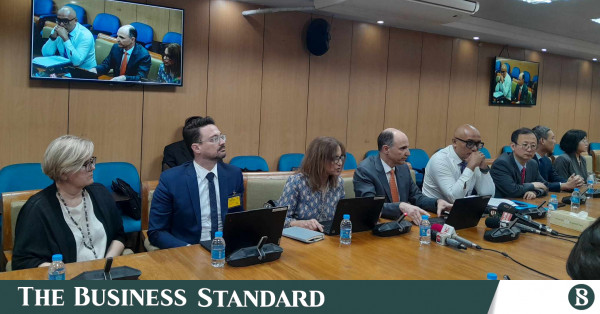Highlights:
- IMF urges to prioritise implementation of tax policy reform
- Says GDP growth fell to 3.3%
- Staff-level agreement in the near term
- Enhancing resilience to climate change key for mitigating macroeconomic, fiscal risks
To address the mounting external financing gap and ensure a continued decline in inflation, near-term policy tightening remains essential, said an International Monetary Fund (IMF) mission team while concluding its Bangladesh visit today (17 April).
“Carefully calibrating the monetary stance to avoid its premature softening will help anchor inflation expectations, while greater exchange rate flexibility will support price competitiveness, rebuild foreign exchange reserve buffers, and strengthen the economy’s resilience against external shocks,” said IMF Mission Chief for Bangladesh Chris Papageorgiou.
The IMF team said the country’s reserves and exchange rate are stable, while the reserve build-up is above their expectations.
The visit during 6–17 April, emphasised discussions on the economic and financial policies in the context of the combined third and fourth review of the IMF’s Extended Credit Facility (ECF), Extended Fund Facility (EFF), and Resilience and Sustainability Facility (RSF).
Chris Papageorgiou further said fiscal consolidation should prioritise the swift implementation of tax policy reform to remove extensive tax preferential treatments and simplify the tax system.
Economy
Regarding the Bangladesh economy, the IMF official said it continues to face multiple challenges amidst elevated global uncertainty. GDP growth fell to 3.3% (year-on-year, y-o-y) in the first half of FY25, down from 5.1% in the same period of FY24, reflecting economic disruptions caused by the popular uprising, a tighter policy mix, and heightened uncertainty that weighed on investment.
After peaking at a decade-high of 11.7% in July 2024, headline inflation eased to 9.4% (y-o-y) in March 2025 but remains well above Bangladesh Bank’s (BB’s) target range of 5–6%, he added.
Boosting revenue and reform
The IMF official said a comprehensive strategy to boost revenue and reform expenditures is crucial for supporting increased social spending and infrastructure investment.
Bangladesh’s persistently low tax-to-GDP ratio underscores the pressing need for tax reforms aimed at building a more equitable, transparent and streamlined system—one that ensures sustainable revenue growth, reduces widespread tax exemptions, improves compliance, and distinctly separates tax policy from administration, he added.
He further said, “Thorough, and well-sequenced financial sector reforms are essential for maintaining stability. Legal reforms should align with international standards, and the authorities must move quickly to operationalise new frameworks that enable orderly bank restructuring while protecting small depositors.”
Effective asset quality reviews (AQRs) strengthened risk-based supervision, and improved governance and transparency will be critical to restoring confidence and supporting the sector’s health.
Simultaneously, institutional reforms to enhance Bangladesh Bank’s (BB’s) independence and governance will be critical for maintaining long-term macroeconomic and financial stability and for the successful implementation of financial sector reforms.
Sustaining the pace of structural reforms is crucial for tackling the country’s economic challenges.
Improving governance and increasing transparency will play a vital role in creating a more favorable investment environment, boosting foreign direct investment (FDI), and expanding export sectors beyond ready-made garments.
Progress in AML/CFT (Anti-Money Laundering/Combating the Financing of Terrorism) risk assessments and enhancements in data quality are equally important, according to the IMF.
Climate Change
Enhancing resilience to climate change is key for mitigating macroeconomic and fiscal risks, the IMF emphasised.
Improving institutional capacity and ensuring more efficient use of resources will support progress toward climate objectives.
The government should prioritise climate-responsive fiscal reforms and direct investments toward sustainable, resilient infrastructure. In addition, effectively managing climate-related risks will help safeguard financial sector stability, the IMF recommended.
IMF’s support
“Discussions are continuing with the objective of reaching a staff-level agreement in the near term—including during the April 2025 IMF-World Bank Spring Meetings in Washington, DC— to pave the way for the completion of the combined third and fourth program review,” said the IMF.
“We reaffirm our commitment to support Bangladesh and its people at this challenging period,” the IMF chief for Bangladesh said.
“The IMF team is grateful to the Bangladesh authorities and other stakeholders for their hospitality and candid discussions.”
The team held meetings with Finance Advisor S. Ahmed, Special Envoy to the Chief Adviser L. Siddiqui, Bangladesh Bank Governor A. Mansur, Finance Secretary Md K. Mozumder, Chairman of the National Board of Revenue Md AR Khan, and other senior officials. The team also met with representatives from the private sector, think tanks, foreign donors, and international development partners.”
Discussions with the Bangladesh Bank on the IMF’s specific objectives will continue, the IMF official said, mentioning that the board meeting may decide whether the third and fourth installments of their loan will be released next June.


